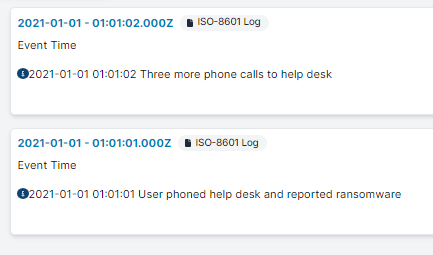Log Types
Cado Response supports the processing of a wide range of evidence types. These may differ slightly based on your cloud platform.
What cloud logs can Cado import from cloud Storage?
Cado can import most cloud log types from cloud storage, including:
AWS Log Formats
- Cloud Trail logs
- Guard Duty logs
- Kubernetes logs
- VPC Flow logs
- SSM logs
Azure Log Formats
- Activity logs
We can process additional log types through our generic extractors, so this list is not exhaustive.
What logs does Cado capture via APIs?
Cado can capture logs from the following cloud services via their APIs:
When acquiring an EC2 system, Cado accesses the CloudTrail API to retrieve VPC flow logs and CloudTrail logs associated with the instance id, if enabled.
When acquiring a Lambda function, Cado accesses the CloudWatch API to retrieve logs associated with the function.
When acquiring Azure compute, Cado retrieves activity logs associated with the VM.
If logs are stored in a central account, at this point Cado does not have the capability to traverse accounts and pull logs from a different account. Instead, you would need to collect them in cloud storage and import from there.
Operating System Log and Artifact Formats
- AppleSystemLog (ASL)
- Androidusage-history (appusage)
- BasicSecurityModule (BSM)
- Bencodefiles
- Chrome Disk Cache Format
- Chrome preferences
- CUPS IPP
- ExtensibleStorageEngine (ESE) DatabaseFile (EDB)
- Firefox Cache
- JavaWeb Start IDX
- JumpLists.customDestinations-msfiles
- MacOS Application firewall
- MacOS Keychain
- MacOS Securityd
- MacOS Wifi
- mactimelogs
- McAfee Anti-Virus Logs
- Microsoft InternetExplorer History File Format (also known as MSIE4-9 Cache Files or index.dat)
- Microsoft IIS log files
- NTFS $MFT and $UsnJrnl:$J
- OLE Compound File
- Opera Browser history
- OpenXML
- Pcap files
- Portable Executable (PE)
- PLSQL cache file (PL-SQL developer recall files)
- Popularity Contest log
- Propertylist (plist)
- RestorePointlogs (rp.log)
- Safari Binary Cookies
- SCCM client logs
- SELinux audit logs
- SkyDrive log and error log files
- SQLite database format using SQLite
- Symantec AV Corporate Edition and Endpoint Protection log
- Syslog
- utmp,utmpx
- Windows EventLog (EVT)
- Windows Firewall
- Windows Job files (also known as "atjobs")
- Windows Prefetch files
- Windows Recyclebin (INFO2and$I/$R)
- Windows NTRegistry File
- Windows ShortcutFile (LNK)
- WindowsXML EventLog (EVTX)
- Xchat and Xchat scroll back files
- Zsh history files
Cado can also import a number of other log formats that are not listed here; however, these evidence types and file formats are not officially supported. If you have a log format that you would like to see supported, please reach out to support@cadosecurity.com and let us know.
Adding Your Own Events
During an investigation, you may want to add our own non-computer generated events to the timeline. For example, it is common to keep a Spreadsheet of key events in a large incident. The simplest way to add these events into a Project timeline is to import an ISO Format Log event of the format:
- YYYY-MM-DD HH:MM:SS Log Event Message
For example you can save the following text into a file named "custom_events.log" then import into the platform:
2021-01-01 01:01:01 User phoned help desk and reported ransomware
2021-01-01 01:01:02 Three more phone calls to help desk
Which will result in events such as the following:
